- About Us
-
Who we are
-
- Publications
-
- ADPC Academy
-
MediaADPC'S NEWS
ADPC at the Asian Ministerial Conference on Disaster Risk Reduction (AMCDRR) ADPC at the Asian Ministerial Conference on Disaster Risk Reduction (AMCDRR)
3 - 5 Jul 2018
Ulaanbaatar, Mongolia
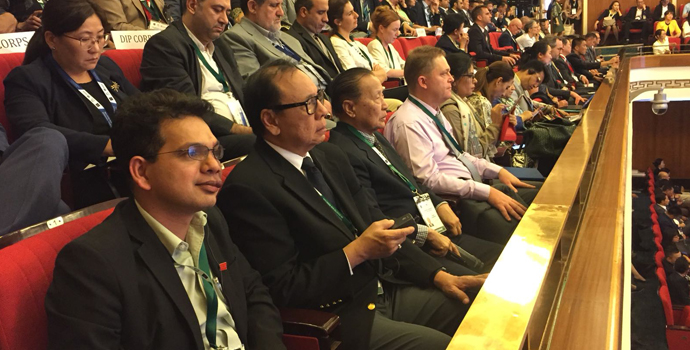
ADPC delegates at the AMCDRR opening ceremony
The Asian Ministerial Conference for Disaster Risk Reduction (AMCDRR) opened with representatives of 50 nations and 1500 organizations from across Asia and the Pacific and beyond on 3 July in Ulaanbaatar, the capital of Mongolia. The Ministerial conference provided an opportunity for participants to exchange experiences on successful practices and innovative approaches to preventing, reducing and managing disaster risks.
The 2018 AMCDRR was co-organized by the government of Mongolia and UNISDR. The conference facilitated a platform for reflecting upon actions taken, over the past three years, in implementing the Sendai Framework and reviewing the progress made towards the commitments at the AMCDRR 2016 through the New Delhi Declaration, the Asia Regional Plan, and ten stakeholder voluntary action statements.
A high-level delegation from Asian Disaster Preparedness Center (ADPC) participated in the AMCDRR and co-organized thematic sessions, side events and also participated in a variety of stakeholder consultations.
ADPC particularly contributed to the thematic areas of risk governance and coherence; private sector and disaster risk reduction; early warning systems, earth observations and data application; community resilience and building-back-better.
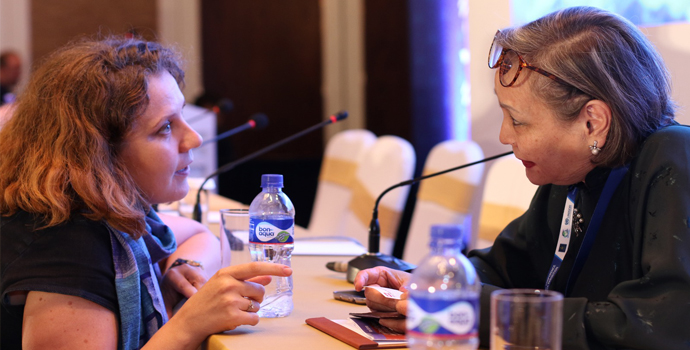
Dr. Hilde Jakobsen, Senior Gender Advisor of ADPC, at the Gender and Inclusiveness session
ADPC delegates facilitated sessions on risk governance and coherence to discuss strategies to support regional stakeholders struggling to translate global frameworks at a national and local level. Delegates further highlighted constrains and opportunities for localization of gender and diversity sensitive disaster risk governance.
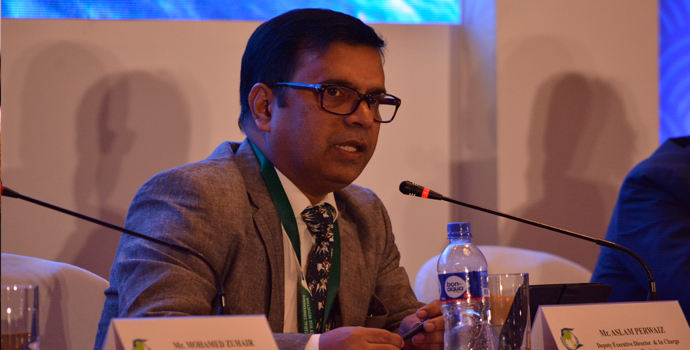
Mr. Aslam Perwaiz, Deputy Executive Director of ADPC, facilitated the thematic event on Private Sector Interventions
Private sector sessions highlighted the increasing engagement between the private and development sector, while enhancing support of the Agenda 2030 through alignment of private sector corporate social responsibility with the SFDRR. ADPC’s delegates urged for increasing focus on building resilient infrastructure through presenting a case study on the 2011 floods in Thailand.
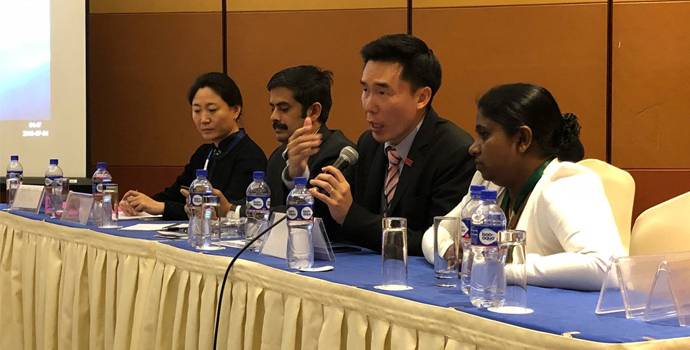
Dr. Peeranan Towashiraporn, Director, Geospatial Information, participated in a panel on applications of earth observation in understanding and monitoring disaster risk
In sessions addressing community resilience, delegates called for action to improve information flow and early warning systems to help communities understand the level of risk they face. ADPC delegates further emphasized the need to make available data understandable and usable by policy and decision makers and pledged to highlight the importance of sex-age-disability disaggregated data (SADD) to assist in evidence-based decision making.
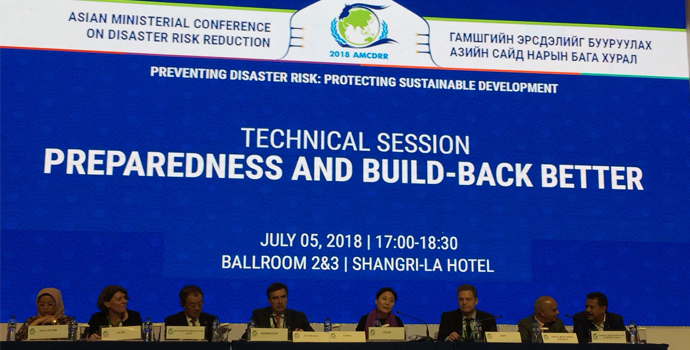
Mr. Hans Guttman, participated in a session on Preparedness and Build-Back-Better
Across community resilience and building-back-better focused sessions, delegates discussed ADPC’s efforts in helping national governments localize preparedness for response and integrate the concept of resilient recovery to their national and local DRR strategies. Sessions further highlighted the critical ingredients for sustainable and institutionalized CBDRM.
ADPC hosted a reception for the delegations of the chartered countries including Thailand, India, Pakistan, China, Nepal, and Cambodia.
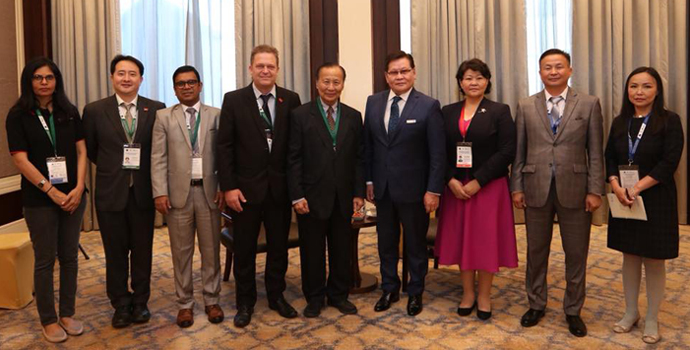
ADPC delegates discussed, with the Deputy Prime Minister of Mongolia, H.E. U. Khurelsukh, opportunities to scale up DRR work in Mongolia
ADPC held several bilateral meetings to discuss potential areas for collaboration. In a meeting with the Deputy Prime Minister of Mongolia, His Excellency. U. Khurelsukh, ADPC delegates discussed opportunities for scaling up disaster risk reduction in Mongolia to implement SFDRR and Agenda 2030.
In a meeting with His Excellency, Mohamed Zuhair, Minister of State Ministry of Defence and National Security, Maldives, ADPC discussed the possibilities of providing support to developing existing CBDRM training curriculum.
ADPC also discussed areas in providing technical knowledge to aid in enhancing the institutional capacity of the NDMO of Afghanistan, Mr. Najib Aqa Fahim, State Ministry for Disaster Management, Afghanistan.
Further engagement areas were explored on the possibility of having Kazakhstan serve as a pilot country for the GIDRM coherence unit implementation with Mr. Yuriv Ilin, Deputy Minister to the Ministry of Internal Affairs, Kazakhstan.
ADPC participated in the media stakeholder consultation and provided its strategic inputs to engage with media to support disaster risk reduction efforts in Asia and the Pacific according to the SFDRR. ADPC contributed to the media stakeholder statement as part of the drafting and review committee.
Risk Governance/Coherence
Mr. Hans Guttman, Executive Director of ADPC, attended a technical session on “Coherence across 2030 Agenda for Sustainable Development” that covered steps undertaken by member states, alongside other stakeholders, in ensuring implementation of global frameworks. Hans also spoke at the "Launch of Coherence Practice Group by Global Initiative on Disaster Risk Management”. The Coherence Practice Group provides regional support for stakeholders, in Asia and the Pacific, struggling to translate global agendas in coherent planning, implementation and reporting processes at a national and local level.
In a technical session “Strengthening Disaster Risk Governance to Manage Disaster Risk,” Mr. Irfan Maqbool, Risk Governance Director, shared ADPC’s efforts in assisting countries, across Asia and the Pacific, in incorporating risk governance in policy frameworks. The session analyzed key constraints and opportunities in achieving the target(s) of the Sendai Framework while focusing on localization and inclusiveness to ensure gender and diversity sensitive disaster risk governance.
Mr. Bill Ho, Strategic Planning Director, attended the session on “Sendai Framework Monitoring”. The session analyzed key constraints/opportunities in achieving the target(s) of the Sendai Framework while focusing on localization and inclusiveness to ensure gender and diversity sensitive disaster risk governance.
During a roundtable discussion at a side event on “Connecting the Dots: Ensuring Sustained Resilience Efforts at the National and Regional Levels” Dr. Senaka highlighted the importance of governments in enhancing communication between local, national and regional forums and facilitating the process of finding coherence across different frameworks at all levels. He briefed participants on the role of the Regional Consultative Committee (RCC) on Disaster Risk in bringing together stakeholders with diverse backgrounds and authority to operationalize global instruments for DRR and climate change and adaptation.
As part of the active role we play in the Gender Stakeholder Group, ADPC co-organized the thematic session on “Gender and Inclusiveness,” with Dr. Hilde Jakobsen, Senior Gender Advisor of ADPC, in attendance to share her perspective on promoting gender equality for better risk reduction. ADPC, alongside partners, also conducted a stocktaking on the progress of implementing Sendai gender commitments over the past two years.
Private Sector and Disaster Risk Reduction
Mr. Aslam Perwaiz, Deputy Executive Director of ADPC, facilitated the thematic event on “Private Sector Interventions” and highlighted ADPC’s experience in scaling-up private sector engagement in risk reduction and resilience-building. Mr. Aslam Perwaiz also took part in the private sector pre-meeting and stakeholder consultation to present increasing engagement between the private sector and development sector, in support of the Agenda 2030, through alignment of the private sector’s corporate social responsibility with the SFDRR.
Dr. Bhichit Rattakul, ADPC’s Special Advisor, presented a case study of the 2011 flood in Thailand during a panel discussion at a feature event on “Strengthening Disaster Resilience Infrastructure and Urban Resilience.” The panelists include Deputy Prime Minister of Mongolia, UNISDR head, and development and humanitarian actors. Dr. Bhitchit discussed how low-level aerial walkways constructed in Bangkok prevented emergency fire trucks from reaching affected areas during the floods. “A stricter approach to land-use planning is needed,” he stated. Dr. Bhitchit further discussed actions required from both the private and public sector, across the region, to enhance urban resilience and building resilient infrastructure.
Early Warning Systems, Earth Observations, and Data Application
ADPC organized a side event, alongside ODI, RCCC, IDE Nepal, on “Strengthening local level Early Warning Systems to build Resilience to Climate Extremes.” Dr. Bhichit Rattakul, Special Advisor, Dr. Peeranan Towashiraporn, Director Geospatial Information, Dr. Senaka Basnayake, Director Climate Resilience and Ms. Chinaporn Meechaiya, Senior Hydrologist, shared ADPC’s work with participants and called for the localization of the early warning systems.
Dr. Bhichit shared the gaps in Thailand’s early warning system that surfaced during the 2011 flood. He said that people were unaware of the risk and scale of the flood, resulting in their lack of response to information from the government.
Dr. Senaka called for action to improve information flow and to enhance the understanding of communities of the level of risk they face. Ms. Chinaporn further suggested that effective early warning systems require connecting all stakeholders at every stage of the system.
In another side event, Mr. Aslam participated in a panel discussion on the “Soft launch of the Global Disaster Database to be installed at the Global Centre for Disaster Statistics.” He shared the role of SERVIR-Mekong and BRDR programs in gathering and understanding data. On behalf of ADPC, he pledged to highlight the importance of sex-age-disability disaggregated (SADD) data; promote SADD data at national and regional levels; and strengthen the capacity of partners in data collection, storage, and accessibility for evidence-based decision making.
In a technical session on “Understanding Risk,” Dr. Peeranan discussed the ease of access to information available in the digital age while highlighting the real challenge as ensuring the available information is both understandable and usable in different formats - as required by policy and decision-makers. At the “Technology and innovations for Urban Solutions: Evidence to Action” side event organized by IFRC, Dr. Peeranan urged participating organizations to invest more in user engagement, capacity development, and political buy-in to achieve urban resilience.
Dr. Peeranan also participated in a panel discussion at a side event on “Earth Observation for Generating Evidence-Based Information to support the implementation of the Sendai Framework.” Citing the example of SERVIR-Mekong, he appraised ADPC’s efforts, with support from partners, in helping countries understand and monitor disaster risk through earth observation applications.
Community Resilience and Building-Back-Better
Hans participated in a panel discussion at the side event on “The Next Frontier for Disaster Risk Reduction in Asia: tackling disaster in fragile and conflict-affected contexts.” Referring to Rohingya Refugee Camps in Cox’s Bazar, Bangladesh, Hans shared ways ADPC is looking into some of the vulnerabilities refugees in Western Myanmar face from being relocated or displaced from their homes. He discussed ADPC’s efforts in identifying the landslide and flash flood risks on the refugee camp, allowing UNHCR to move out vulnerable populations within the camp before the monsoon season started just last month.
Hans also participated in a panel discussion at the technical session on “Preparedness and Build–back-better.” Citing the example of environmental degradation, he described ADPC’s work in helping national governments, across Asia and the Pacific, localize preparedness for response and integrate the concept of resilient recovery in national and local DRR strategies.
Mr. Irfan Maqbool, Risk Governance Director, shared ADPC’s experience and best practices for community-based disaster risk reduction and highlighted critical ingredients for sustainable and institutionalized CBDRM with other civil society members at a side event on ‘What if you had the perfect recipe for community-level implementation of SFDRR?”
Latest NewsRelated Trainings
-